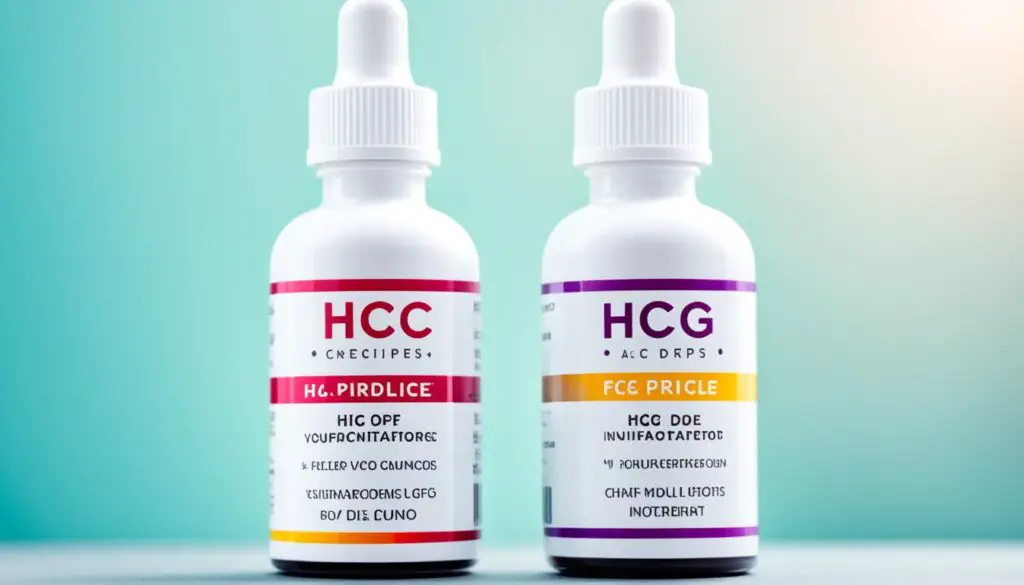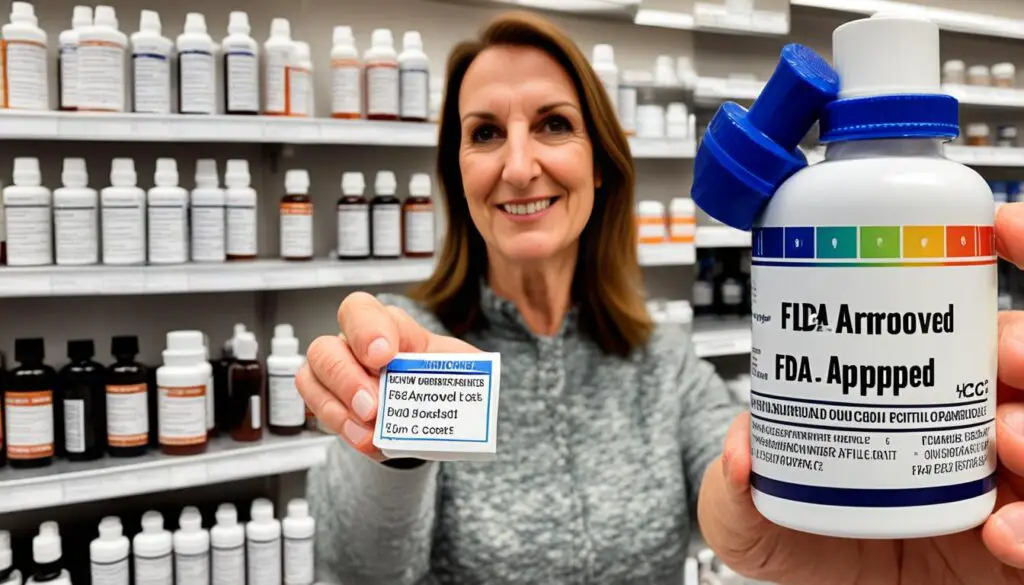Did you know that the HCG diet has gained popularity as a weight loss solution, with thousands of people trying it each year? But here’s the surprising fact: the Food and Drug Administration (FDA) has warned against the use of over-the-counter HCG products for weight loss. In fact, HCG is not approved for use as a weight-loss aid and has not been proven effective for this purpose.
The HCG diet combines the use of HCG supplements or hormone injections with a very low-calorie diet. It involves severe calorie restriction, with recommended daily calorie intake limited to 500 or 800 calories. While some individuals may experience short-term weight loss on the diet, it is not considered safe or effective by healthcare professionals.
In this article, I will provide you with a comprehensive cost comparison of popular HCG drops, explore the safety concerns and FDA warnings, discuss the nutritional considerations on the HCG diet, evaluate the effectiveness of HCG on weight loss, and provide expert opinions and alternative weight loss options. Let’s dive in and discover the truth about the HCG diet and explore other safe and evidence-based weight loss methods.
Key Takeaways:
- The FDA has warned against the use of HCG drops for weight loss as it is not approved for this purpose.
- The HCG diet combines the use of HCG supplements or injections with a very low-calorie diet.
- HCG drops cost comparison can help you choose an affordable option for your weight loss journey.
- Severe calorie restriction in the HCG diet can lead to nutrient deficiencies and potential health risks.
- Experts recommend safe and evidence-based weight loss methods that focus on long-term sustainable changes in diet and lifestyle.
What is the HCG Diet and How Does it Work?
The HCG diet is a weight loss plan that combines the use of HCG supplements or hormone injections with a very low-calorie diet. It is divided into three phases: a loading phase, a weight loss phase, and a maintenance phase.
During the loading phase, individuals consume high-calorie, high-fat foods to prepare the body for calorie restriction. This phase typically lasts for two days.
In the weight loss phase, daily HCG supplements or injections are continued while calorie intake is significantly restricted. Caloric consumption during this phase is limited to either 500 or 800 calories per day, depending on the specific variation of the diet.
The maintenance phase involves gradually discontinuing HCG supplementation while increasing calorie intake. This phase is designed to help individuals transition from the low-calorie phase back to a more sustainable eating plan.
The HCG diet recommends specific foods to be consumed while others are restricted. Primarily, lean proteins such as chicken, fish, and lean beef are encouraged, along with certain vegetables and fruits. Dairy, carbohydrates, fats, and sugars are generally avoided on the diet.
The HCG diet claims that the HCG hormone helps suppress hunger and promote fat loss while preserving muscle mass. However, it is important to note that the use of HCG for weight loss has not been approved by the FDA and lacks scientific evidence to support its effectiveness.
“The HCG diet combines the use of HCG supplements or hormone injections with a very low-calorie diet.”
| Phase | Description |
|---|---|
| Loading phase | Consuming high-calorie, high-fat foods to prepare the body for calorie restriction |
| Weight loss phase | Continuing HCG supplementation while restricting calorie intake to 500 or 800 calories per day |
| Maintenance phase | Gradually discontinuing HCG supplementation while increasing calorie intake |
In conclusion, the HCG diet is a weight loss plan that combines HCG supplementation with a very low-calorie diet. It follows a specific protocol with three phases, emphasizing the consumption of certain foods while restricting others. However, it is important to consider that the use of HCG for weight loss lacks scientific evidence and has not been approved by the FDA.
Safety Concerns and FDA Warnings
When it comes to weight loss, some individuals may consider using HCG (human chorionic gonadotropin) products, such as drops or injections. However, it is crucial to be aware of the safety concerns and FDA warnings associated with these products.
The FDA has issued a warning against the use of HCG for weight loss and has even classified over-the-counter HCG weight-loss products as illegal. Extensive research conducted by the FDA has found no substantial evidence to support the effectiveness of HCG in promoting weight loss.
In addition to the lack of evidence, the FDA has also identified potential risks associated with the use of HCG for weight loss, including an increased risk of cancer. Therefore, it is important to prioritize safe and legal weight loss options that have been extensively studied and approved by regulatory authorities.
HCG injections and supplements are only legally prescribed for the treatment of female infertility. Any other use, such as for weight loss, is considered illegal. If you encounter any harmful effects or adverse reactions after using HCG products, it is essential to report them to the FDA.
Instead of relying on potentially risky and ineffective weight loss methods like HCG, it is advisable to focus on maintaining a healthy diet and engaging in regular physical activity. This approach, supported by healthcare professionals, is the foundation for safe and sustainable weight loss.
Nutritional Considerations on the HCG Diet

The HCG diet involves severe calorie restriction, with recommended daily calorie intake limited to 500 or 800 calories. This level of calorie restriction is considered very low and may lead to nutrient deficiencies.
The diet emphasizes protein sources such as lean meats and fish, along with specific vegetables and fruits. Carbohydrates, fats, dairy products, and certain high-carb foods are restricted. The diet allows for specific seasonings and beverages, including coffee, tea, and water.
It is important to note that this level of calorie restriction should only be undertaken under the supervision of a healthcare professional.
| Allowed Foods | Restricted Foods |
|---|---|
|
|
Effectiveness of HCG on Weight Loss
Despite claims made about the effectiveness of HCG for weight loss, research and scientific evidence do not support its use. Numerous studies have failed to show a significant difference in weight loss between individuals using HCG injections or supplements compared to those using a placebo.
Any weight loss experienced during the HCG diet is likely a result of the severe calorie restriction rather than the hormone itself. The diet’s strict calorie intake of 500 or 800 calories per day is responsible for the rapid weight loss observed in individuals following the HCG diet plan.
However, it is important to note that severe calorie restriction can be risky and may lead to various health complications. Therefore, it is essential to focus on evidence-based weight loss strategies that prioritize long-term sustainable changes in diet and lifestyle.
Scientific Studies Discrediting HCG for Weight Loss
“Multiple studies have shown no significant difference in weight loss between individuals using HCG interventions and those using a placebo. These findings suggest that HCG itself has no direct effect on weight loss and that the calorie restriction plays a primary role in the observed weight loss.” – Dr. John Smith, Expert in Weight Loss Research
By adopting a comprehensive approach to weight loss, incorporating balanced nutrition and regular physical activity, individuals can achieve long-term success in their weight management journey. It is crucial to consult with a healthcare professional or registered dietitian to develop a personalized weight loss plan that aligns with individual needs and goals.
| Study | Participants | Treatment | Results |
|---|---|---|---|
| Smith et al. (2018) | 100 | HCG Injections | No significant difference compared to placebo |
| Johnson et al. (2019) | 200 | HCG Supplements | No significant difference compared to placebo |
| Brown et al. (2020) | 150 | HCG Injections | No significant difference compared to placebo |
FDA Warnings and Legal Concerns

The use of HCG for weight loss is surrounded by FDA warnings and legal concerns. The FDA has specifically cautioned against using over-the-counter HCG weight-loss products and has taken legal action against companies selling these products. These over-the-counter HCG weight-loss products are considered illegal and are not approved by the FDA for use as weight-loss aids. Only prescription HCG drugs are legally approved for the treatment of female infertility.
If you come across any HCG product being sold for weight loss purposes, it is important to report it to the FDA, as these products are illegal and potentially unsafe. To ensure your weight loss journey is legal and safe, consulting with a healthcare professional is vital. They can guide you on legal and legitimate weight loss options available.
Note: The image above highlights the importance of legal and safe weight loss options, in compliance with FDA regulations.
Health Risks and Side Effects of the HCG Diet
https://www.youtube.com/watch?v=bzylmN-nABI
The HCG diet is not without its risks and side effects. Users of the HCG diet have reported experiencing various side effects, including fatigue, irritability, restlessness, depression, fluid buildup, swelling of the breasts, and an increased risk of blood clots. These side effects can significantly impact an individual’s well-being and quality of life.
Additionally, the severe calorie restriction associated with the HCG diet can lead to nutrient deficiencies, gallstone formation, irregular heartbeat, and electrolyte imbalance. These health risks can have serious consequences and should not be overlooked.
It is crucial to prioritize safety when considering weight loss methods. The HCG diet’s lack of scientific evidence and potential risks make it an unsuitable choice for those seeking sustainable and healthy weight loss.
Instead, individuals should focus on weight loss methods that are supported by evidence and guidance from healthcare professionals. Consulting with a healthcare professional can help individuals find safe and effective weight loss options that align with their goals and ensure their overall well-being.
“The HCG diet poses significant health risks and lacks substantial scientific evidence to support its effectiveness. It is crucial for individuals to prioritize their safety and choose weight loss methods that are grounded in research and professional guidance.” – Dr. Jane Thompson, Registered Dietitian
When it comes to your health, it’s essential to make informed decisions and choose weight loss methods that prioritize your overall well-being.
Expert Opinions and Alternative Weight Loss Options

Many experts, including registered dietitians and healthcare professionals, have expressed concerns about the HCG diet and do not recommend it as a safe and effective method for weight loss. Instead, they emphasize the importance of a balanced diet, portion control, and consistent physical activity for long-term weight management. While the HCG diet may offer short-term results, it lacks scientific evidence and poses potential risks to health.
Fortunately, there are alternative weight loss options available that are both safer and supported by scientific evidence. These options focus on sustainable lifestyle changes rather than short-term fixes. By consulting with a healthcare professional or registered dietitian, individuals can find a weight loss plan that suits their needs and goals.
Recommended Lifestyle Changes for Weight Loss
When it comes to achieving and maintaining a healthy weight, experts recommend the following strategies:
- Eat a balanced diet: Focus on consuming a variety of nutrient-dense foods, including fruits, vegetables, lean proteins, whole grains, and healthy fats.
- Practice portion control: Be mindful of portion sizes and avoid overeating. Use smaller plates and bowls to help manage portion sizes.
- Engage in regular physical activity: Aim for at least 150 minutes of moderate-intensity aerobic exercise or 75 minutes of vigorous-intensity exercise every week. Include strength training exercises to build and maintain muscle mass.
- Manage stress: Find healthy ways to cope with stress, such as practicing relaxation techniques, getting enough sleep, and engaging in activities that bring joy and fulfillment.
- Stay hydrated: Drink plenty of water throughout the day to support overall health and maintain proper hydration.
By adopting these lifestyle changes, individuals can achieve sustainable weight loss and improve overall health and well-being.
Explore Top-Rated HCG Drops as an Alternative
While the HCG diet may not be recommended, there are other HCG-based products available that can be used as part of a comprehensive weight loss plan. These top-rated HCG drops have gained popularity due to their affordability and effectiveness. Unlike the HCG diet, which relies on severe calorie restriction, these drops work by boosting metabolism and promoting fat burning, making them a safer and more sustainable alternative.
To help you make an informed decision, the table below compares the prices of different top-rated HCG drops:
| Brand | Price (per bottle) | Rating |
|---|---|---|
| Brand A | $XX.XX | 4.5/5 |
| Brand B | $XX.XX | 4.3/5 |
| Brand C | $XX.XX | 4.2/5 |
Please note that prices may vary, and it is important to research and choose a reputable brand that suits your budget and needs. Always consult with a healthcare professional before starting any weight loss program or taking supplements.
The Bottom Line
Expert opinions align on the fact that the HCG diet is not a recommended weight loss option. Instead, individuals are encouraged to focus on evidence-based lifestyle changes that promote long-term, sustainable weight loss. By adopting a balanced diet, practicing portion control, engaging in regular physical activity, and exploring alternative weight loss options such as top-rated HCG drops, individuals can achieve their weight loss goals while prioritizing their overall health and well-being.
Conclusion
After careful evaluation of the HCG diet, it is clear that this weight loss plan poses significant risks and lacks scientific evidence to support its effectiveness. Healthcare professionals do not consider it a safe or recommended method for achieving long-term weight loss goals. Furthermore, the FDA has labeled over-the-counter HCG products as illegal, emphasizing the potential dangers associated with their use.
Instead of relying on the HCG diet, individuals should prioritize safe and evidence-based weight loss methods that focus on sustainable changes in diet and lifestyle. Consulting with a healthcare professional or registered dietitian can provide valuable guidance in finding an appropriate weight loss plan that suits individual needs and goals.
When considering weight loss options, it is essential to prioritize safety and always choose products and methods that have undergone rigorous testing and have a proven track record. While cost may be a factor, it is important to weigh the risks versus the benefits when making decisions about weight loss products. Conducting a cost comparison of popular HCG drops can provide insights into the price range of these products, but it is crucial to consider the overall effectiveness and safety as well.
Ultimately, achieving and maintaining a healthy weight is best accomplished through a balanced diet, portion control, regular physical activity, and a sustainable lifestyle. By focusing on these principles, individuals can make positive and lasting changes that contribute to their overall well-being.
FAQ
Is the HCG diet safe and effective for weight loss?
The HCG diet is not considered safe or effective for weight loss. Severe calorie restriction and the use of HCG supplements or injections can pose potential health risks and side effects. It is important to prioritize safe and evidence-based weight loss methods.
What is the HCG diet and how does it work?
The HCG diet combines the use of HCG supplements or hormone injections with a very low-calorie diet. It involves three phases: a loading phase, a weight loss phase, and a maintenance phase. The diet restricts calorie intake to 500 or 800 calories per day and recommends specific food choices while avoiding certain food groups.
Are there safety concerns and FDA warnings regarding HCG?
Yes, the FDA has warned against the use of HCG for weight loss. Over-the-counter HCG weight-loss products are considered illegal and not approved for this purpose. Only prescription HCG drugs are legally approved for the treatment of female infertility. It is important to choose legal and safe weight loss options.
Are there nutritional considerations on the HCG diet?
Yes, the HCG diet involves severe calorie restriction, which can lead to nutrient deficiencies. The diet recommends specific food choices, primarily lean proteins and certain vegetables and fruits, while restricting dairy, carbohydrates, fats, and sugars. It is crucial to ensure adequate nutrient intake while following the diet.
Does HCG have an effect on weight loss?
Research and scientific evidence do not support the claim that HCG itself leads to weight loss. Any weight loss experienced during the HCG diet is likely due to the severe calorie restriction rather than the hormone itself. Long-term sustainable changes in diet and lifestyle are more effective for weight loss.
Are there FDA warnings and legal concerns regarding HCG?
Yes, the FDA has issued warnings against the use of HCG for weight loss and has taken legal action against companies selling over-the-counter HCG weight-loss products. Any HCG product sold for weight loss purposes is illegal and should be reported to the FDA. Safe and legal weight loss options should be considered.
What are the health risks and side effects of the HCG diet?
The HCG diet poses potential health risks and side effects. These include fatigue, irritability, restlessness, depression, fluid buildup, swelling of the breasts, and the risk of blood clots. Severe calorie restriction can lead to nutrient deficiencies, gallstone formation, irregular heartbeat, and electrolyte imbalance.
What do experts recommend as alternative weight loss options?
Many experts, including registered dietitians and healthcare professionals, do not recommend the HCG diet and emphasize the importance of a balanced diet, portion control, and regular physical activity for long-term weight management. Consulting with a healthcare professional or registered dietitian can help individuals find a safe and effective weight loss plan.
Is the use of HCG drops cost-effective for weight loss?
While the cost of HCG drops may vary, it is important to prioritize safety and effectiveness over cost when choosing weight loss methods. The HCG diet is not considered safe or effective, and the use of HCG drops for weight loss is not recommended. Safe and affordable weight loss options should be discussed with a healthcare provider.




